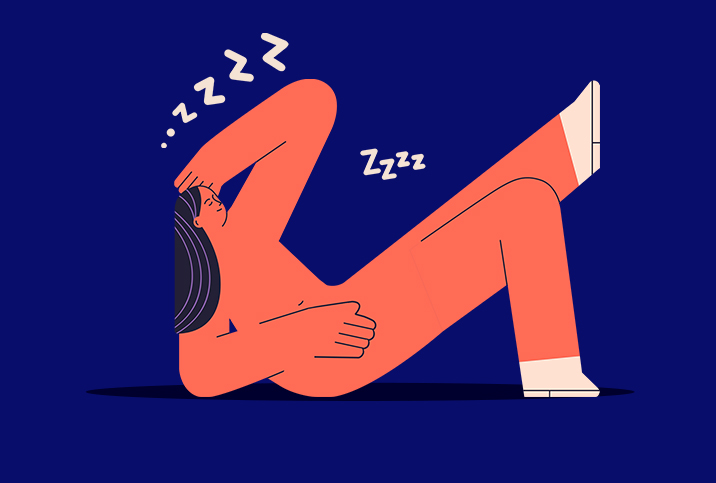Getting the Sleep and All the Pleasure You Need

As any medical professional specializing in sleep health will advise, your bed should be reserved for engaging in only two pastimes: sleep and sex.
But what's the connection between those two activities?
Researchers have discovered a direct correlation, tying the quality and amount of sleep you get to your sexual drive and health. That means sleep hygiene is a topic well worth discussing with your romantic partner.
Open, honest dialogue can help ensure everyone is getting the rest—and pleasure—they need.
How sleep impacts your sexual health and sex drive
Our sex drive and sexual health are both supported by sleep, said Chester Wu, M.D., medical reviewer for Rise Science, based in Houston. The company produces Rise, an energy and sleep tracker subscription app. Wu pointed to research concluding that the amount of sleep we get affects how turned on we may be the next day.
"A 2015 study in the Journal of Sexual Medicine found longer sleep duration was related to greater sexual desire the next day," said Wu, who is board certified in psychiatry and sleep medicine. "In fact, a one-hour increase in sleep increased the odds of women having sex the next day by 14 percent, and women who slept for longer reported better genital arousal than those who slept for shorter amounts of time."
Not getting enough sleep can also alter hormone levels, Wu said, leading to reduced sexual desire and genital arousal, as well as erectile dysfunction (ED) in men over a longer period of time.
"Testosterone is a key sex hormone for both men and women, and it's intrinsically linked with sleep," he added. "One study looked at men who slept for five hours a night for one week, something that's not too uncommon. Their testosterone levels fell by 10 to 15 percent. That may not sound like a lot, but normal aging is linked to a decrease in testosterone levels of 1 to 2 percent per year. A lack of sleep can also raise cortisol levels. High levels of cortisol may cause a reduction in sex hormones, which can impact sexual desire and genital arousal."
It's not all bad news, though, when it comes to the connection between sex and sleep, which Wu described as a "virtuous circle."
"Orgasms improve sleep by triggering oxytocin and prolactin and suppressing cortisol, resulting in a more relaxed body and mind and an easier time falling asleep," Wu explained. "Orgasms, especially in women, also cause brain activity to decrease in the amygdala, hippocampus and prefrontal cortex, reducing alertness, anxiety and decision-making, respectively, which can all help with falling asleep."
Don't let sex get in the way of rest
While it may be tempting to stay up all night aiming to trigger all the oxytocin and prolactin you can muster, sleep deprivation and poor sleep quality can create life-altering physical and mental health changes.
"Our health is affected more quickly and more profoundly by sleep deprivation than we might imagine," Wu noted.
Chelsie Rohrscheib, Ph.D., a sleep specialist at Wesper, a New York City-based company that produces wearable sleep diagnosis tools aimed at helping people improve their sleep, explained what can happen when we forsake sleep for sex (or any of the other less fun activities that prevent us from getting a good night's rest).
"In the short term, sleep deprivation or poor sleep quality leads to excessive daytime sleepiness [and] reduced cognitive functioning, for example, poor attention or memory. [Also,] headaches, upset stomach, altered appetite, physical fatigue, poor mood and an increased risk for accidents," she said.
Rohrscheib listed the long-term effects of not getting enough quality sleep:
- An increased risk for various chronic health conditions, such as obesity, cardiovascular disease, diabetes, cancer and certain neurological conditions
- A weakened immune system can lead to frequent illness and infection
- An increased risk for mental health disorders such as depression and anxiety
- An extremely increased risk of motor vehicle accidents
- Chronic headaches
Talking to your partner about sleep
Sleeping in the same bed as your romantic partner can be one of the most comforting, relaxing experiences imaginable, and yet sometimes, it can become a hellish nightmare if your partner's sleep is affecting yours in a negative way or vice versa.
Rohrscheib advised keeping a sleep journal to track your partner's times of disordered sleep, with these six areas top of mind:
- Sleep habits
- Length of sleep
- Sleep schedule
- Quality of sleep
- Signs and symptoms of sleep disorders
- Signs and symptoms of poor sleep
"Do they sleep soundly throughout the night or do they wake up frequently or get restless?" Rohrscheib asked.
After gathering data for a few nights, broach the topic and share what you've tracked with your bedmate, but remember to lead with empathy, especially if tempers flare, Wu advised.
"A lack of sleep can undermine every aspect of a person's functioning, including their emotional health," he said. "A sleep-deprived person can be more irritable and reactive. Anticipating this demeanor can help [you] have a more productive conversation."
Wu explained that timing is essential when talking to your partner about how their sleep is negatively impacting you.
"Have the conversation when your sleep-deprived partner is best equipped to have a challenging conversation," he said. "Avoid having the conversation during the morning period of grogginess right after waking, as well as before bed when our energy is naturally waning. It is doubly important not to have the conversation during our wind-down to bedtime, as we need this time to relax our minds and bodies to sleep."
Techniques to improve your sleep (and your sex life)
After the tough conversation ends, it's time to make a mutually agreed-upon plan for improvement.
Rohrscheib, Wu and their colleagues in sleep medicine agree on several techniques and behaviors you and your romantic partner can adopt today to help improve your quality of sleep. In turn, that's going to do wonders for your sexual drive and health:
- Create the optimal sleep environment. "It should be cool, dark and quiet," Wu advised.
- Recognize it's OK to separate. "If your partner's poor sleep habits are affecting your sleep, consider using devices such as an eye mask and ear plugs to minimize your own sleep disturbances," Rohrscheib said. "You can also opt to sleep in another room from your partner to ensure your sleep is not affected."
- Stick to cutoff times for sleep-disrupting behaviors. "That means no caffeine 10 to 12 hours before sleep, no alcohol or meals two to three hours before sleep and no vigorous exercise one hour before sleep," Wu said.
- Work to reduce stress. "Increased stress levels raise blood cortisol levels, which is extremely wake-promoting and keeps the nervous system in fight-or-flight mode," Rohrscheib said. "Stress can also lead to an overactive mind. This can make it very difficult to fall asleep and stay asleep."


















